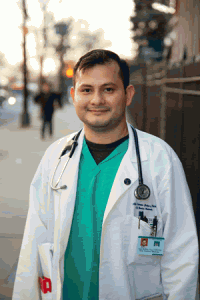One year ago I began my journey from medical school at Albert Einstein College of Medicine into residency training at Montefiore Medical Center in the Bronx.
Having grown up in the South Bronx, the opportunity to practice family medicine in my hometown was a challenge that I welcomed, though the responsibility to care for the area’s most disadvantaged was a bit overwhelming at first.
The experience has been rewarding and humbling. What I’ve learned is that being human and speaking to patients in a way that makes sense to them is often just as important as making the correct diagnosis or coming up with the perfect treatment plan.
But sometimes the exhilaration that I’m on the right track is followed by the realization that I still have a lot to learn.
Case in point. I’m now the primary care provider of an 11-month-old diagnosed with intraventricular hemorrhage (IVH). This is a condition characterized by bleeding within the ventricles of the brain with potentially serious neurological complications.
The mother is young. The infant is her first child. On the third clinic visit, as I had done on previous encounters, I asked the mom about her own condition. She replied “fine” and appeared to be coping well with the stress. A sense of relief washed over me.
I felt competent and even congratulated myself for doing a great job. I presented the case to my supervising attending who agreed with my assessment and treatment plan. During his interaction with this mother, the attending also showed compassion, as I had done. However, he went further.
He assured the mom that “the baby is going to be fine.”
The mother broke into tears, crying almost inconsolably.
“The baby is going to be fine.” These simple words are so powerful, so reassuring. Why had it not occurred to me to say them? In retrospect, I was caught up in the medical jargon and diagnosis. Too focused on the technical aspect of doctoring.
But I was also afraid to utter such simple yet powerful words. I knew medically that the baby had a high likelihood of recovery but I didn’t want to make a promise that might not come true.
This is the real world of doctoring for me, developing a continually growing base of knowledge while balancing a desire to be there for my patients.
I don’t always achieve the balance as easily as I’d like. I’m still learning.
One lesson is ingrained. By being honest with myself and my patients, I will be a more effective and humanistic doctor.
Join the Discussion: What have you learned as a doctor?


